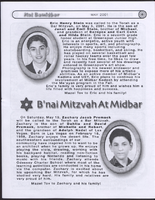Search the Special Collections and Archives Portal
Search Results

Southern Nevada Historical Society Photograph Collection on Basic Magnesium, Inc.
Identifier
Abstract
The Southern Nevada Historical Society Photograph Collection on Basic Magnesium, Inc. contains photographs of the construction of Basic Magnesium Inc.'s plants and buildings from 1941 to 1942. The photographs primarily depict aerial views of the plant site and various buildings, including the administration building, tent camp, chlorination buildings, electrolysis facilities, electrical distribution systems, and warehouses. The photographs also depict Lake Mead and the early buildings in Henderson, Nevada.
Archival Collection
Las Vegas Art Museum Records
Identifier
Abstract
The Las Vegas Art Museum Records (1952-2009) contain administrative files, press, marketing materials, and scrapbooks that document the history of the Las Vegas Art Museum (LVAM). Collection materials include exhibition files, annual reports, financial statements, board meeting agendas and minutes, event invitations, press releases, and newspaper and magazine clippings documenting the museum's activities. Materials include photographs from museum events as well as photographs of artwork displayed as part of visiting and permanent exhibitions. Audio and video recordings include interviews with museum staff and local news coverage of events. Also included are architectural floor plans for the Sahara West Library, which was used as a gallery space for LVAM. Digital files in this collection include recordings and presentation slides from LVAM lectures with curators and artists. Other digital files include photographs from LVAM events and workings files from LVAM staff.
Archival Collection

Jessica Anderson oral history interview: transcript
Date
Archival Collection
Description
Oral history interview with Jessica Anderson conducted by Claytee D. White on March 7, 2019 for the Remembering 1 October Oral History Project. Anderson begins talking about her early life, family, work history, and the reason why she had moved to Las Vegas, Nevada in 1991. She goes on to talk about the history of Outdoors Nevada where she currently works, and what she was doing the day of October 1, 2017. Anderson recalls how she found out about the shooting, reaching out to friends, and learning more about what happened that night. Anderson talks about the aftermath of the event, how it affected everyone involved, and the healing aspect afterwards. Lastly, she describes the process of creating the Healing Garden, the features of the garden, and the future plans for the area.
Text

Transcript of interview with Betsy Fretwell by Claytee White and Stefani Evans, August 30, 2016
Date
Archival Collection
Description
Shortly before the University of Georgia granted Betsy Fretwell Master's degree in public administration in 1991, she applied for a one-year internship with Clark County, Nevada. The County hired her, but Fretwell did not complete her internship. Instead, the County promoted her, hired her full-time, and soon had her lobbying for the County's interests in Carson City. Her insistence on learning all sides of a question and communicating that knowledge to the decision makers was one of the skills that made her so valuable to Clark County administrators. In this interview, Fretwell discusses her South Carolina childhood, her affinity for the University of Georgia Bulldogs, and the path she took to occupy the office of city manager for the City of Las Vegas. She talks about her years at Clark County and a term at the City of Henderson, but she mostly focuses on her sixteen years at the City of Las Vegas, first as assistant city manager under Virginia Valentine and later as city manage
Text

Transcript of interview with Sally L. Jackson by Krista Jenkins, March 2, 1980
Date
Archival Collection
Description
On March 2, 1980, collector Krista Jenkins interviewed assistant manager, Sally L. Jackson, (born March 28th, 1932 in Culver City, California) in her home in Las Vegas, Nevada. The interview covers the social and environmental changes that have occurred in Las Vegas. Sally also discusses the hospitality industry and offers details on the local hotels, casinos, and nightclubs in Las Vegas, Nevada.
Text

Transcript of interview with Ralph Denton by K.J. Evans, approximately 1999-2000
Date
Archival Collection
Description
On an unknown date (likely 1999-2000) and time, K.J. Evans interviewed Ralph Denton, an adviser to former Governor Grant Sawyer and political figure in Nevada for many years. Denton first talks about his personal friendship with Sawyer, their education in law school, and his eventual work on campaigning for and working with Sawyer after he became governor. Denton then explains the controversy regarding Denton’s accepting of complimentary services (comps) at hotels. He later describes his work as a Clark County Commissioner and then talks about working as district attorney in Esmeralda County, Nevada. Denton then talks about the influences that led him to be interested in a career of law and later speaks more about working with Grant Sawyer, specifically about serving as his adviser, afterwards providing the argument on why he believes Sawyer was the greatest governor of Nevada. Toward the latter part of the interview, Denton describes his work on improving civil rights and some of the challenges that came with that. The two also discuss how the practice of law has changed over time. To conclude the interview, Denton describes his experience in running for governor and how he would have served as governor if he had been elected.
Text

Transcript of interview with Betty Ham Dokter by Roger Jablonski, February 27, 1977
Date
Archival Collection
Description
On February 27, 1977, Roger Jablonski interviewed Betty Ham Dokter (born 1922 in Las Vegas, Nevada) about her life in Southern Nevada. Dokter first talks about her upbringing and education in Las Vegas before describing church activity and the first casino properties that were built. She later talks about presidential visits, economic changes in Nevada, the construction of Hoover Dam, and some of the social changes in Las Vegas. The latter part of the interview covers the topics of racial minorities, environmental changes, early grocery stores and movie theaters, and social clubs. The interview concludes with a brief discussion on Mt. Charleston.
Text


